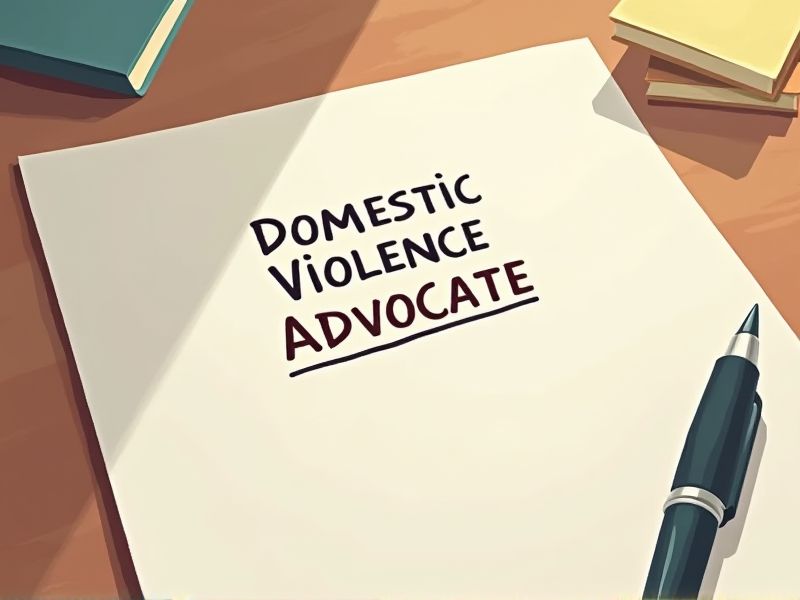
Domestic violence advocates require specific certifications to ensure they possess the necessary skills and knowledge to support survivors effectively. These certifications often cover crucial areas like crisis intervention, legal rights of survivors, and trauma-informed care. The training enhances their ability to create a supportive environment and navigate complex situations with professionalism. Below are some essential certifications for a career as a Domestic Violence Advocate.
Domestic Violence Advocate Certification
Domestic violence advocate certification enhances credibility, ensuring advocates are recognized as qualified professionals in their field. Training programs associated with certification provide standardized knowledge and skills, enabling advocates to offer informed support and guidance to survivors. Certification often includes components on legal rights and available resources, equipping advocates to navigate complex systems effectively. Organizations that employ certified advocates may benefit from reduced liability and improved service outcomes.
Crisis Intervention Certification
Crisis Intervention Certification equips domestic violence advocates with the skills to de-escalate potentially volatile situations, ensuring the safety of victims. This certification provides advocates with the knowledge to recognize signs of trauma, which is essential for offering appropriate support. Having formal training increases an advocate's credibility, fostering trust among victims seeking help. Certification also enhances coordination with law enforcement and social services, promoting a unified response to domestic violence incidents.
Trauma-Informed Care Certificate
Trauma-Informed Care Certificate equips domestic violence advocates with essential skills to recognize and understand the profound impact of trauma on survivors, thereby improving support strategies. Training in this area enhances the advocate's ability to create a safe and supportive environment, crucial for the healing process of those affected. Trauma-informed approaches reduce the risk of re-traumatization, which can occur when survivors are not approached with sensitivity and understanding. The certificate provides advocates with up-to-date, evidence-based practices that align with the complex needs of survivors, ensuring more effective intervention and advocacy.
Victim Advocacy Certification
Victim Advocacy Certification is crucial for domestic violence advocates as it equips them with specialized knowledge and skills to effectively support survivors. Certification ensures that advocates are familiar with legal protocols and resources, enabling them to navigate the complex justice system on behalf of victims. This formal training encourages consistency in advocacy practices, fostering a trusted community of support for those affected by domestic violence. With certification, advocates demonstrate a professional commitment to maintaining ethical standards and up-to-date understanding of emerging trends in victim support.
Court Advocacy Specialist Certificate
A Court Advocacy Specialist Certificate equips domestic violence advocates with crucial legal knowledge, enabling them to navigate the complexities of the judicial system effectively. Holding this certification often enhances the advocate's credibility, which can influence court proceedings and outcomes positively. Advocates with formal training are better prepared to provide accurate information and support to survivors, potentially leading to more favorable legal resolutions. The certificate may also open opportunities for specialized roles, increasing an advocate's impact in the field of domestic violence.
Safety Planning and Risk Assessment Certification
Acquiring a Safety Planning and Risk Assessment Certification equips domestic violence advocates with structured guidelines to identify potential threats effectively. Trained advocates are better prepared to develop customized safety strategies that address the unique circumstances of each survivor. Certification ensures that advocates can apply evidence-based methodologies that enhance the survivor's security and well-being. A standardized certification process raises the professional credibility of advocates, promoting trust among clients and stakeholders.
Mental Health First Aid Certification
Mental Health First Aid Certification equips domestic violence advocates with the necessary skills to identify and respond to signs of mental distress in survivors. Providing informed support reduces the likelihood of re-traumatization and can significantly improve the survivor's psychological well-being. Educating advocates on mental health enables them to make appropriate referrals to mental health professionals, ensuring comprehensive care. The certification enhances the advocate's confidence, increasing their effectiveness in crisis situations.
Conflict Resolution and Mediation Certification
Obtaining a Conflict Resolution and Mediation Certification equips domestic violence advocates with essential skills to effectively de-escalate tense situations, directly impacting the victim's safety. Certified knowledge enhances an advocate's ability to facilitate communication between conflicting parties, often leading to safer outcomes for survivors. The certification provides advocates with a structured understanding of negotiation techniques, crucial for influencing positive resolutions in volatile environments. This specialized training allows advocates to navigate complex interpersonal dynamics, fostering an overall more supportive environment for those affected by domestic violence.
Cultural Competency Training Certificate
Cultural competency training provides domestic violence advocates with essential understanding of diverse cultural backgrounds to effectively support victims. This training enhances the advocate's ability to communicate with empathy and respect, minimizing cultural barriers that might prevent victims from seeking help. Understanding cultural nuances helps in recognizing signs of abuse that might differ across communities, ensuring timely and appropriate intervention. Obtaining a certificate demonstrates a commitment to continuing education and professional development in the field of domestic violence advocacy.
Child Abuse and Neglect Intervention Certification
Child abuse and neglect intervention certification equips a domestic violence advocate with specialized knowledge to identify and address situations involving minors effectively. Due to the interconnected nature of domestic violence and child abuse, trained advocates can spot early warning signs and offer targeted support. This certification ensures adherence to legal protocols and the implementation of best practices when dealing with vulnerable children. With this expertise, advocates can create a safer environment, facilitating better access to necessary resources for affected families.
Summary
When you obtain certifications as a Domestic Violence Advocate, your credibility and skills become more recognized among peers and clients. This recognition often leads to increased trust from survivors seeking support, enhancing your ability to facilitate effective interventions. Certifications can also open opportunities for you to collaborate with other professionals and organizations, broadening resource networks. Your expertise is likely further validated, contributing not only to your personal growth but also to the advocacy community as a whole.
